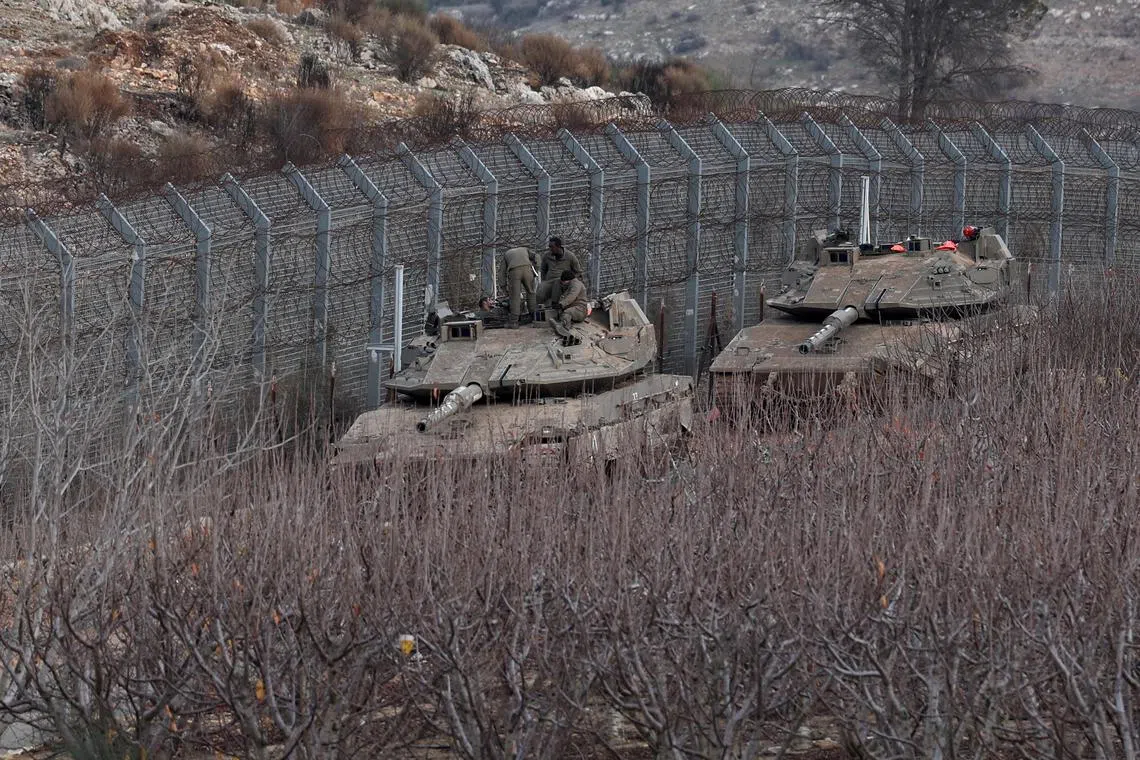Israel says it will impose ‘sterile defence zone’ in southern Syria
Sign up now: Get ST's newsletters delivered to your inbox

Israeli tanks at the security fence between Israel and Syria, near the Druze village of Majdal Shams, in the Israeli-annexed Golan Heights, on Dec 10.
PHOTO: EPA-EFE
JERUSALEM/DAMASCUS - Israel has ordered its forces to create a “sterile defence zone” in southern Syria that would be enforced without a permanent Israeli presence as it tightens its hold along the line between Syria and the Israeli-occupied Golan Heights, Defence Minister Israel Katz said on Dec 10.
He gave no details but said the zone, would “prevent the establishment and organisation of terror in Syria” after the collapse of the government of President Bashar al-Assad
“We will not allow this, we will not allow threats to the state of Israel,” Mr Katz said following a visit to a naval base in the northern Israeli port of Haifa.
Earlier, a military spokesperson said Israeli troops remained in the demilitarized buffer zone in Syrian territory created after the 1973 Arab-Israeli war as well as “a few additional points” outside the separation area.
But he denied that forces had penetrated Syrian territory significantly beyond the zone, after Syrian sources said the incursion had extended to within 25km of the capital Damascus.
“IDF forces are not advancing towards Damascus. This is not something we are doing or pursuing in any way,” Lieutenant-Colonel Nadav Shoshani, the military spokesperson, told a briefing with reporters.
Israeli media reported that the air force had carried out as many as 250 sorties as war planes struck a string of targets across Syria since the weekend. The operation, which appears to have been one of its biggest in years, aimed to ensure Syrian military equipment, including combat aircraft, missiles and chemical weapons, does not fall into rebel hands.
“We have no intention of interfering in Syria’s internal affairs, but we clearly intend to do what is necessary to ensure our security,” Prime Minister Benjamin Netanyahu said.
“I authorised the air force to bomb strategic military capabilities left by the Syrian army, so that they would not fall into the hands of the jihadists.”
In addition to the airstrikes, Mr Katz said Israeli missile ships had destroyed a Syrian military fleet in an operation on the night of Dec 9 that British security firm Ambrey said targeted at least six vessels in the Syrian port of Latakia.
Limited, temporary measure
Following Mr Assad’s flight on Dec 8, Israeli troops moved into the demilitarised zone inside Syria, including the Syrian side of the strategic Mount Hermon that overlooks Damascus, where it took over an abandoned Syrian military post.
Israel, which has just agreed to a ceasefire in Lebanon
But the move has been condemned by states including the United Arab Emirates and it remained unclear how far beyond the designated buffer zone its troops had stopped.
Three security sources said on Dec 10 the Israelis had advanced beyond the demilitarised zone. One Syrian source said they had reached the town of Qatana, several kilometres to the east of the zone and just a short drive from Damascus airport.
Israel welcomed the fall of Mr Assad, an ally of its main enemy Iran, but has reacted cautiously to the leading rebel faction, Hayat Tahrir al-Sham (HTS).
HTS has its roots in Islamist movements including Al-Qaeda and Islamic State though it has sought for years to moderate its image.
“We want relations with the new regime in Syria,” Mr Netanyahu said but added that if Iranian weapons were transferred through Syria to Hezbollah or of Israel were attacked “we will respond forcefully and we will exact a heavy price”. REUTERS


